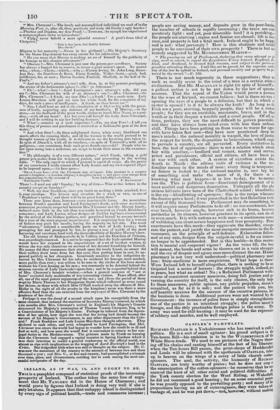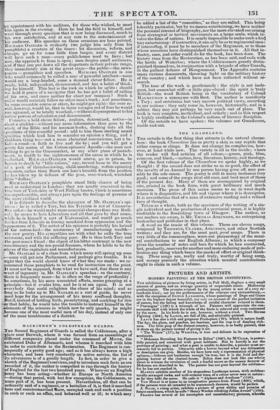OASTLER'S PAMPHLETS..
RICHARD OASTLER is a Yorkshireman who has received a call it politics. He is a sort of small agitator: his grand subject is the Ten-hours Bill—his ambition is to be the WILBERFORCE of the White Slave-trade. We used to see pictures of the Negro throw- ing off his chains and casting himself at the feet of his liberator: when the Ten-hours Bill passes, the print-shops of Huddersfield and Leeds will be adorned with the apotheosis of 0AsrLaa, take: up to heaven on the wings of a covey of little cherub cotton- spinners. The zeal, the activity, the humanity of Rien,uta OASTLER, are truly worthy of praise; but he does not stop al the emancipation of the cotton-spinners—he eonceives that he coo unravel the knot of all other social and political difficulties. At the York county election for the West Riding, at Wakefield, he did not command a good hearing ; for on. some essential pointi he was greatly opposed to the prevailing partl; and many of his propositions having an air of extravagauce„they were taken ad. vantage of, and he was put down,—nok, hawmr, without maiiiag n appointment with his auditors for those ■ieho wished, to meet im again in the evening. Here le had the field to himself, and went through every question- that is now beim:, discussed, much to his own satisfaction, and at any rate to the entertainment of is audience. His speeches on these occasions are here printed. RICHARD OASTLER is evidently (we judge him only from his pamphlets) a creature of the times : let discussion, reform, and change, go on for some little time longer, and every district will have such a man—every publichouse used to have ; but now, the approach to fame is open ; men despise small audiences, and if they can put down all the disputants in their private range, they immediately aim at the great stage—the public—the news- apers — pamphlets and speeches. RICHARD OASTLER is one who would commonly be called a mar. of powerful intellect—some would say a long-beaded, some a damned clever fellow. He is eady, bold; independent, disinterested, and has a habit of think- ing for himself'. This last is the rock on which he splits : should we hold it praise of a navigator that he has got a habit of sailing of his own, and cares neither for chart nor compass ? Such a sailor would certainly follow no other man's track ; and sometimes, eby some eccentric course or other, he might get right : the sure re - suit, however, would be, that in three voyages out of four he would run aground, or be totally wrecked,—Without disparagement to his native powers of calculation and discernment. Conceive a bold clever fellow, zealous, determined, active—in :17.:,seshort a stickler—without any more information than goes to the study of the Bible and his account-books, dashing into all the questions of this eventful period : add to him those sterling moral qualities which • lead him to consider an opinion a thing, and a stubborn thing too--not a mere rhetorical convenience, but a be- lief—a creed—a faith to live and die by - and you will get a eoretty fair notion of the Cotton-spinners' :Apostle—the man now villing to go to the Grassmarket, or any other place of punish- nent, to testify to the righteousness of the cause in which he is embarked. RICHARD OASTLER would starve, go to prison, be .beaten to death by "billy-rollers," nay, turned loose to the mercy of a pack of thumbscrewing, child-murdering, cotton-spinning overseers, rather than flinch one hair's breadth from the position he has taken up in defence of the poor, over-worked, wretched it-tie "doffers."
RICHARD OASTLER'S pamphlets stand little chance of being read or understood in London ; they are mostly conceived ill the rue tone of Yorkshire or West Riding banter, which is sometimes .:7-incompre1ensible, and always jars upon the feelings of persons of "- the more civilized world.
• It is difficult to describe the character of Mr. OASTLER'S opi- nions : he is called a Tory, but his Toryism is not of Conserva- tive order—be would make more essential changes than any Radi- ce!: he seems to hate Liberalism and all that goes by that name, he is himself a sort of 'Universalist, and would go much ee:lier than Liberals in freeing mankind from oppression and the • appearance of it. The sectet of his opinions is probably his hatred of the cotton-lord—the aristocracy • of manufacturing wealth- . the new gentry. His sympathies are with what he calls the 'true aristocrat, and with the suffering poor. He is thus both Tory and . the poor man's friend : the object of his bitter contempt is the new constituency and the ten-pound freemen, whom he holds to be the slaves of the capitalists and manufacturers. Mr. OASTLER is of a class from which many will spring. up soon —some will get into Parliament, and perhaps give trouble. It is right that the world should know of what they are made : we re- commend these pamphlets to be read for instruction on the point. It must not be supposed, from what we have said, that there is any _Avant of ingenuity in_ Mr. OASTLER'S speeches : on the contrary, - there is frequently more—he is often on the verge of profundity ; he sometimes, by his mere unassisted efforts, seems grasping at a principle—but it evades him, and he is at sea again. It is not everybody that could enlighten the chaos of his mind; and as . long as he looks up to Mr. SADLER as a sort of guide, he never need hope for the arrangement of his many confused thoughte. But if, instead of holding forth, proselytizing, and suckling for this or that hobby, he would take the trouble to instruct himself in the elements of the sciences in which now he only quacks, he might become one of the most useful men of his day, instead of only one -of the most troublesome of a district.























 Previous page
Previous page